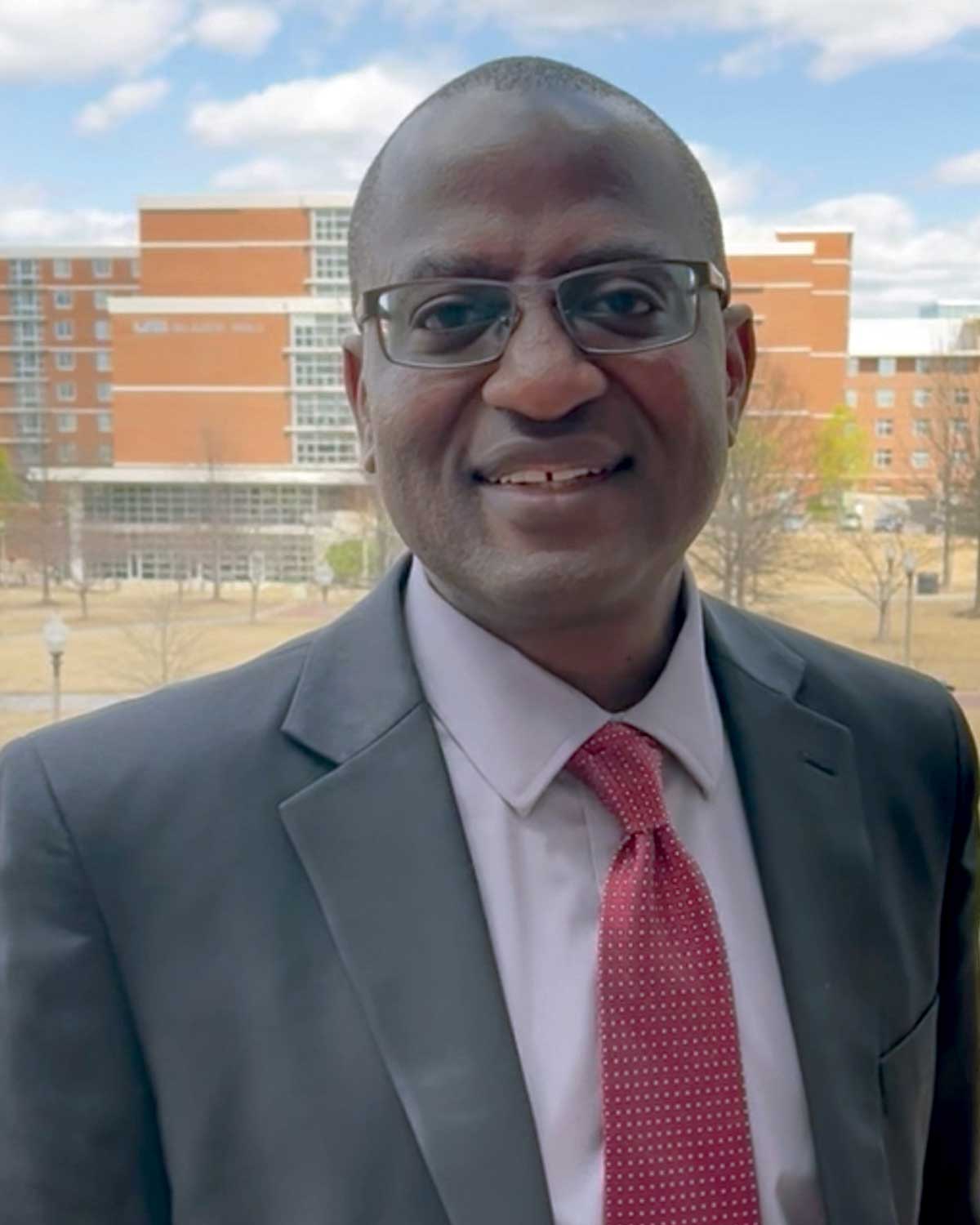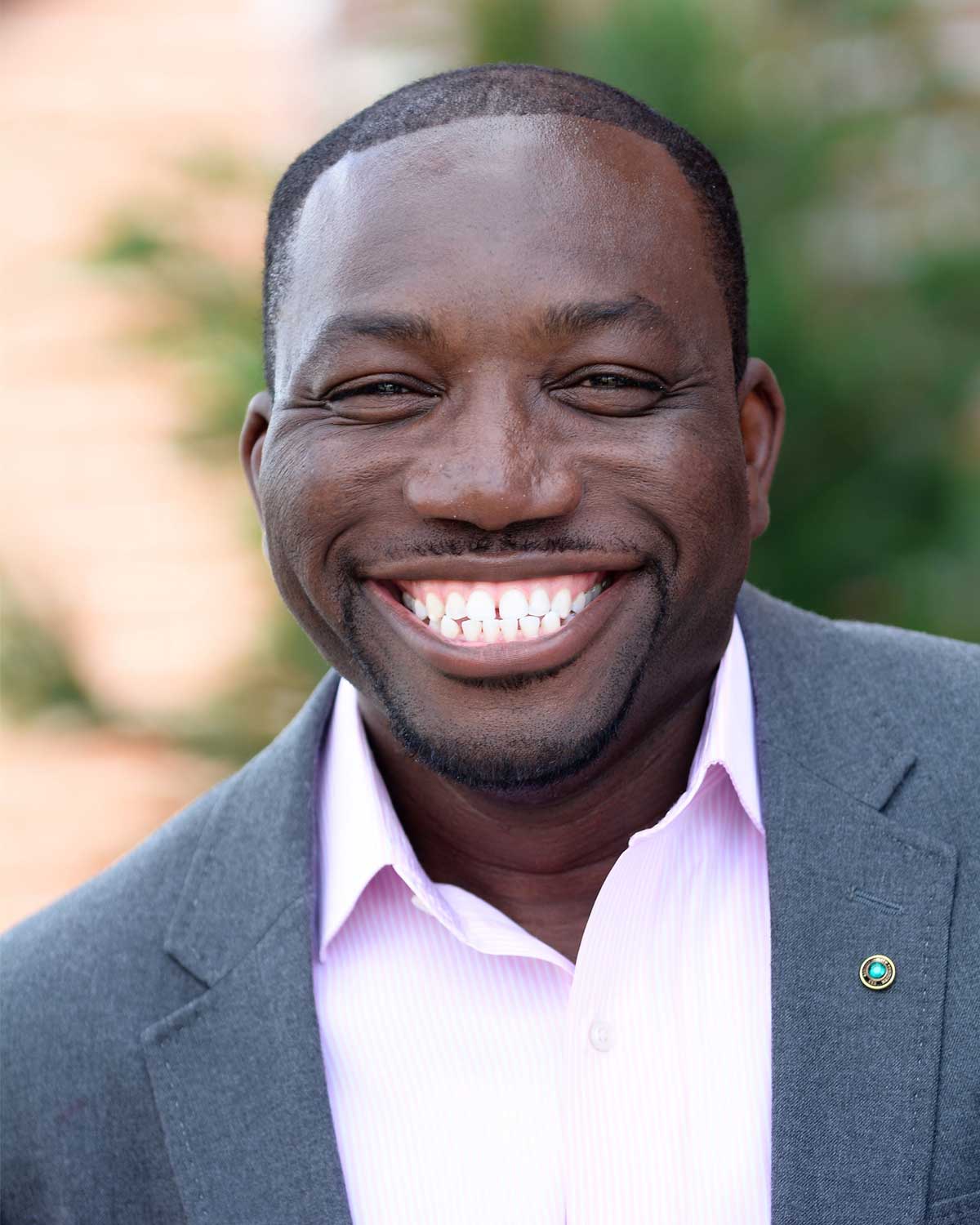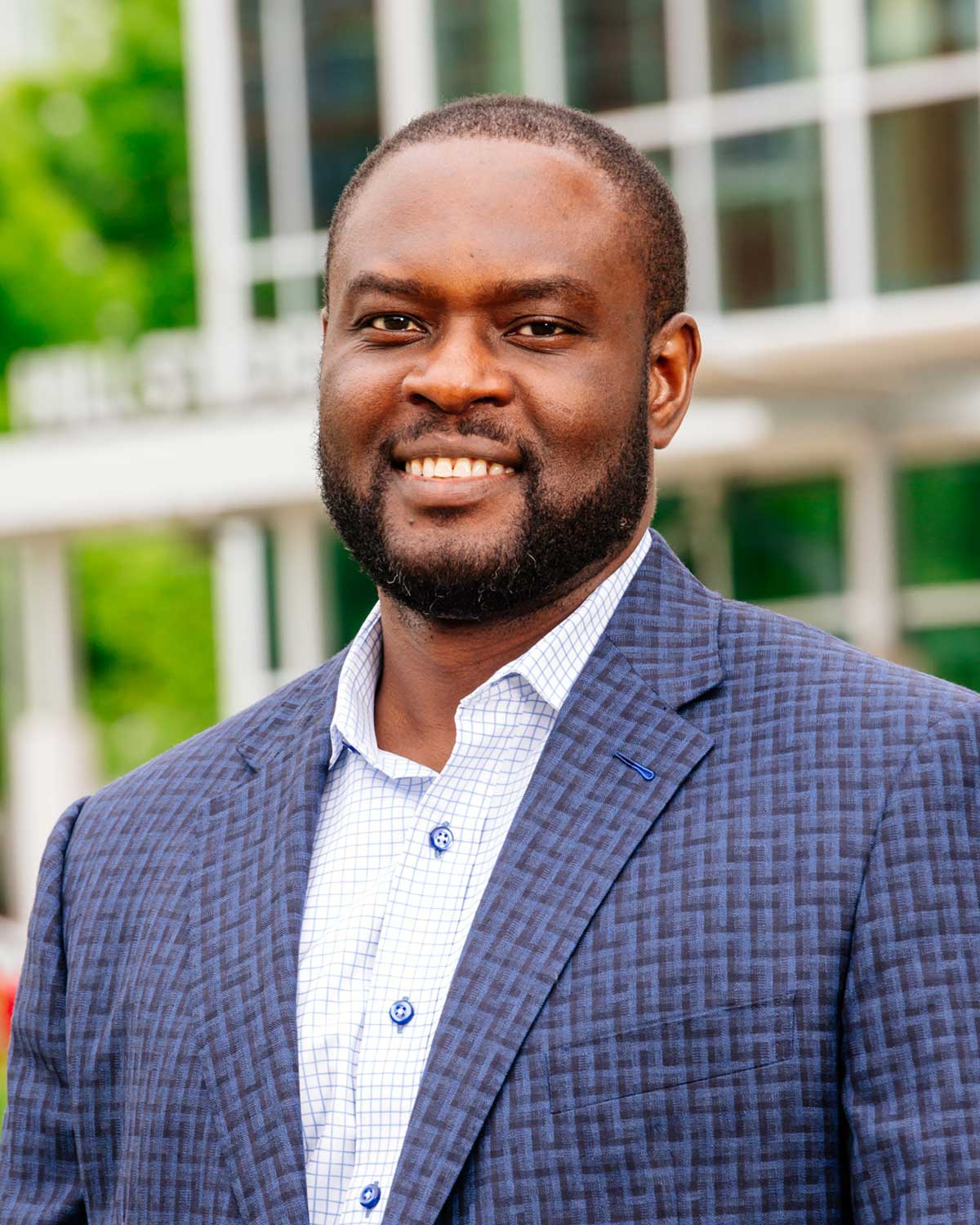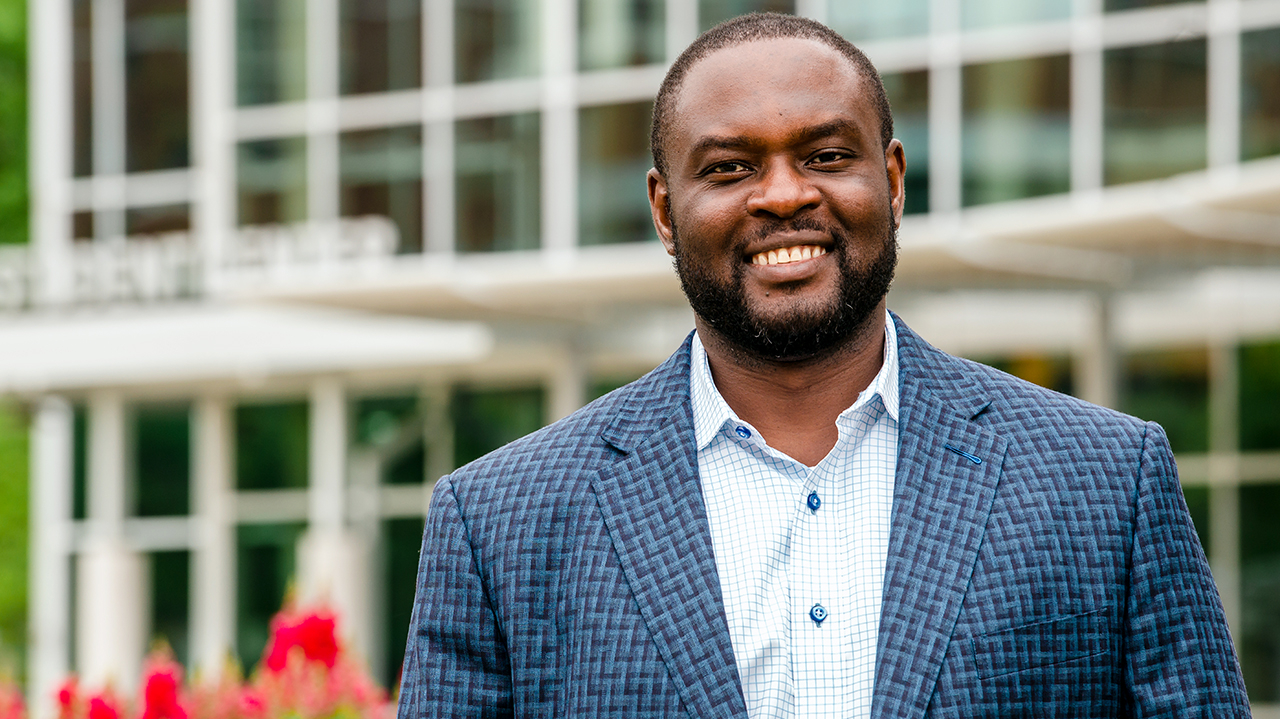How did they do it?
Stephen Odaibo, M.D.
A different kind of superpower
 Photo: Stephen Odaibo, M.D.
Photo: Stephen Odaibo, M.D.
Odaibo grew up in Ilorin, a city roughly four hours north of Lagos. His father is a physician, and Odaibo was set on a career in medicine — if basketball didn’t pan out. He flew to Birmingham in 1998 with his brother David, a year older, to start studying at UAB. (David Odaibo, Ph.D., earned a B.S. in Electrical Engineering in 2003 and a doctorate in Computer Engineering in 2019 from UAB. David was co-founder and chief technology officer of Birmingham-based Analytical-AI before passing away unexpectedly in his sleep on Sept. 11, 2021). Stephen Odaibo is married to Lisa, a pediatrician. In 2017, he was selected to receive the Distinguished Alumni Achievement Award from the UAB College of Arts & Sciences, the College’s highest alumni honor.
How did you choose UAB?
“I knew I wanted to come to school in the United States and so did my brother. We just looked in a directory of U.S. schools. We wanted a school that was affordable and nationally recognized for research. And I wanted to do premed, so UAB seemed like a great fit.
“My dad said, ‘Let them go,’ but my mom said, ‘My babies!’ Then the bill showed up, and my dad said, ‘What’s so special about the U.S.?’ But mom said, ‘Let them go,’ so we went.”
You were following in your father’s footsteps as a doctor?
“I wanted to play basketball! My brother and I were on the high school team in Nigeria, we were competitive in the area and the state, and we thought we were pretty good. We went to Bartow Arena and knocked on the coach’s door. We said, ‘We just got off the plane and we would love to play for UAB.’ He gave us a funny look and said, ‘We’ll give you a call.’ That never came. So I quickly decided on medicine.”
But you majored in math through UAB’s fast-track program, which allows students to earn bachelor’s and master’s degrees in as little as four years.
“I knew all along I wanted to do something with math. I love it. The Fast Track Program was really wonderful. I was a TA, got a stipend, had an office and one-on-one mentoring. We were assigned a new faculty member to mentor us each semester. The Friday seminars, the teas — it was great. The professors at UAB were wonderful; I was just on campus in March for an alumni event and most of them are still going strong. I really learned how to think.
“Then at Duke I got a master’s degree in computer science in 2009 and finished medical school in 2010. People said, ‘Why did you switch?’ [from math]. I never switched. I always was seeking to make it work, this combination of math and medicine. And the abstractions and the power of mathematical thinking, in my perspective, can find expression only through a computer.”
Your company, RETINA-AI, uses artificial intelligence for medical diagnoses. Where did that idea come from?
“It was my brother, David, who introduced me to AI in 2012. He told me about deep learning. As an ophthalmologist, I look at pictures of the retina, and those images tell me what I am going to do. He told me about deep learning, that a computer could look at a picture and make the decision that I would make. I started looking into it and my jaw literally dropped. I said, this will completely revolutionize the field of medicine.
“We have built a device that can detect diabetic retinopathy. We started a trial in November 2022 with 1,000 patients. I trained the algorithms inside of our device, which required knowledge of the regulatory piece, the math and the clinical aspect. You wouldn’t really be able to hire someone to do that. With my background, I could.
“It’s been an opportunity to be a leader in the field. In addition to diabetic retinopathy, we believe there are applications for glaucoma, Alzheimer’s, and other systemic diseases that you can detect in the retina.”
What drives you as an entrepreneur?
“The entrepreneurial side is important to me because I want to see solutions that are real, that are reaching patients. It is very hard but very gratifying. I’m the chief technology officer as well as the founder and CEO, so I am forced to keep learning intensely. It’s the intensity of a med student who has an exam coming up, every day. My wife is crucial in all of this. She’s been a really great supporter.”
What is your advice for startup success?
“If it’s the right thing, you just have to stick with it. The first thing is to find out the purpose of what you are trying to do and why. You need that clarity. It can never be, ‘I want to be rich.’ Success from this standpoint is being able to create wealth, not flaunt it. A lot of my clothes are the clothes I was wearing when I was at UAB. My wife and I have one car. To me, being nonmaterialistic has become a kind of superpower. It has allowed me to accumulate capital. It allowed me to make long-term decisions that are investment minded.”
Bolaji Kukoyi
Once-in-a-lifetime opportunity
 Photo: Bolaji Kukoyi
Photo: Bolaji Kukoyi
Kukoyi hails from Lagos, one of the world’s largest cities. “There are people from every race, every tribe,” he says. By the time he came to UAB in 1998, Kukoyi already had family on campus. His brother, Oladipo — known as “Ladi” — had a scholarship to go to medical school and chose UAB as it was ranked in the top 20 nationwide in his areas of interest: family medicine and psychiatry. Ladi Kukoyi, M.D., graduated from the School of Medicine in 1999 and is now executive director of Birmingham VA Health Care. Their younger sister, Mobola, also came to UAB a few years after Bolaji, earning undergraduate and master’s degrees before going to Duke University for medical school. (Another brother, Yinka, is a partner at the global accounting firm KPMG.) In 2007, Bolaji and the engineering firm he founded, Dynamic Civil Solutions, were recognized in the UAB National Alumni Society’s Excellence in Business Top 25 awards program.
How did you end up majoring in both engineering and math?
“Stephen was mostly focused on his math. For me, I wanted to be an engineer. My attraction to the Fast Track Program was money. [The program had scholarship funding available through the National Science Foundation.] I was a 17-year-old kid paying out-of-state tuition and working 20 hours a week for $5 an hour. Tuition for my first year was mostly generated on credit cards. Several other international students were doing the Fast Track, so I probably heard about it at the I-House. I was pretty decent at math, and they would pay me to do it? I thought, ‘Sign me up.’
“It was a lot of work, but also great exposure; I did a lot of tutoring in and out of classrooms. Most of us, we got here because our parents gave us everything they had. We were investments to them. There was no safety net. We just had to get it done, regardless of how many hours it took.”
That sounds like a lot of pressure.
“No pressure, just motivation. I love a challenge. I don’t like to lose; if you beat me, I am coming back for you. That pushes me to do better. I push my guys all the time. I tell them, ‘There is no sloppy work that leaves this office.’ I want people pushing me.
“It is the same with Shegun and Stephen. There is inspiration we draw from each other, feeding off each other. When we were in school, we hung out at Stephen’s apartment a lot and we had one car that we shared among us. I’m happy for what they are doing and for their success and I know they feel the same. I see Stephen every time he is in town, and I play racquetball with Shegun two or three times a week.”
Racquetball is your game?
“I love the pace, but I love all things racquet: table tennis, pickleball, tennis. I like to talk some smack and I love to sweat. It’s a good workout.”
Stephen talked about your success at pool. Did your math training help with that? The angles and everything?
“I’m not sure about that. I know some not-so-bright people who are pool champions.”
What is your engineering firm’s specialty?
“At Dynamic Civil Solutions, we do all things infrastructure: site circulation, layout, parking, utilities, firefighting. We have been involved in a lot of the major projects on campus, including the Collat School of Business, PNC Field, the School of Nursing, the new inpatient rehabilitation facility. We also work all over the state. We have several projects in Huntsville, several in southwest Alabama and in Montgomery.”
What does the future hold for Birmingham?
“From a civil engineering standpoint, there are a lot of deficiencies in infrastructure. That has to be fixed, and we are here at the right time, with the record spending on infrastructure [through President Biden’s Infrastructure Investment and Jobs Act, which will invest $110 billion in extra spending on major projects and repairs for roads and bridges]. These are maybe once-in-a-lifetime projects in your city.
“I do a lot of traveling, and everywhere I go I am soaking in what I see: we could use that in Birmingham; that would be a great addition. When I go to conferences and talk to national firms, I pick up nuggets here and there and think, what does that look like for our city?”
It must be exciting to be a part of Birmingham’s growth.
“Birmingham is in this transition from being a commuter city to a true urban city. There are projects like Protective Stadium and Regions Field, as well as road diets, Birmingham Express transit stations and a focus on bicycles, pedestrians, and alternate modes of transportation. Being able to be involved in those things and being part of the change is really something. When I drive around, I can say, ‘We’ve been involved in changing the landscape of the city I live in.’ I’ve lived here for 25 years. My wife is from Choctaw County. My kids were born here in Birmingham, and my business was born here. Birmingham is home for me.”
Shegun Otulana
Curating your experience, wherever you are
 Photo: Shegun Otulana
Photo: Shegun Otulana
Otulana, like Kukoyi, was born and raised in Lagos, he had an older brother already at UAB before he arrived, and he has an older brother and younger sister who are medical doctors. His older brother, Ade, has undergraduate and graduate degrees from UAB. Ade went to medical school in New Jersey, but returned to practice medicine in Birmingham. Shegun’s younger brother, Tobi, earned an undergraduate degree in Mechanical Engineering and an MBA from UAB.
You are a serial software entrepreneur. How did that journey start?
“I came here to do electrical engineering, but what I really wanted to do was computer engineering or software engineering. I realized UAB wasn’t accredited for this at the undergraduate level and added Management Information Systems as a minor, then a double major. Things were hard financially, and I started working in tech as an intern. It paid well to help with my tuition, so I decided to graduate with my MIS degree and told myself I would come back to finish my electrical engineering degree. I’m yet to return. I’m not crazy about accumulating degrees like some of my fellow Nigerians!
“I got a job in the city’s engineering department and then I worked at U.S. Infrastructure, and finally at Biohorizons Implant Systems. I then started Zertis, a software consulting company that built software products and also acted as my idea lab. Then in 2013, I launched TheraNest, software for mental and behavioral health practices, which later became Therapy Brands. After I sold Therapy Brands, I created Harmony Venture Labs and other software companies.”
What is the goal of Harmony Venture Labs (HVL)?
“We are really focused on building companies that we believe can thrive in the context of cities like Birmingham. We double down on software ideas that serve the largest segments of the U.S. economy. Our primary focus is on B2B [business-to-business], software-as-a-service businesses. Our companies include Copysmith, one of the leading AI companies for generative text, with millions of users — people use us to kick off their own writing journeys and companies embed it into other solutions that need content, such as ecommerce platforms. Copysmith also owns Rytr and Frase. HVL believes that innovation is essential to creating meaningful impact in places like Birmingham. Other HVL companies include ListedKit, transaction and closing management software for real estate teams in brokerage firms and their customers. Other companies include Cowello and Appthink. Our hope is our companies can have a tangible impact in growing the technology ecosystem in Birmingham.”
So you don’t think you have to be a born entrepreneur?
“I grew up in an entrepreneurial family. My parents were not very educated, they just hustled — renting property out, owning gas stations. They did what they could. I had no interest in my parents’ business, but you do see this correlation between entrepreneurial parents and entrepreneurial children.
“With that said, I think everybody has these skills, to varying degrees. Everything we do as people requires creativity and ingenuity. But the situation is a little different when you are growing a startup. You need to be always on, need to move fast, need good ways to manage the stress, to tell a story and be able to get others to believe in that story and project a compelling vision.
“I think some people are born with it and then improve their skills. But I also believe that it can be learned. Most people can do it. That’s what we are doing with Harmony Venture Labs. If 20 people start companies, six will succeed to varying degrees as long as they are in the right environment and they get the timing of the idea right. Another six will fail; it’s just not for them. It doesn’t mean they aren’t great people, or innovators, or smart. They are just not wired for that level of intensity, insight-gathering, and urgency around building high-growth companies. The remaining eight can learn, and we are able to nudge them to figure it out and build. We hope to help them build right here in Birmingham.”
TheraNest was a massive success. Why did you decide to stay in Birmingham for your next act?
“My fundamental belief is that entrepreneurship is a great force for good in the world. Economic empowerment is a really powerful answer to a lot of the problems we face in society – either by founding companies or being part of them. The next generation is better for it.
“You can find success anywhere you are. You have to learn what your unique advantages are. You can curate some version of success wherever you find yourself. That is what happened to me here. I also met my wife at UAB. Our family is here. We have a lot of ties to Birmingham. We don’t run from where we have ties, we build on them. We build more TheraNests. We put a stake in the ground and say, for however long I’m here, I have an obligation to this place and its people.”
Final question: You and Bolaji play racquetball several times a week. Who wins?
“Bolaji! I have no trouble giving him that. Anything that involves your hands — racquetball, pool, tennis — that’s his game. When it comes to the feet, that’s me. I’m the better dancer and soccer player — and singer.”


